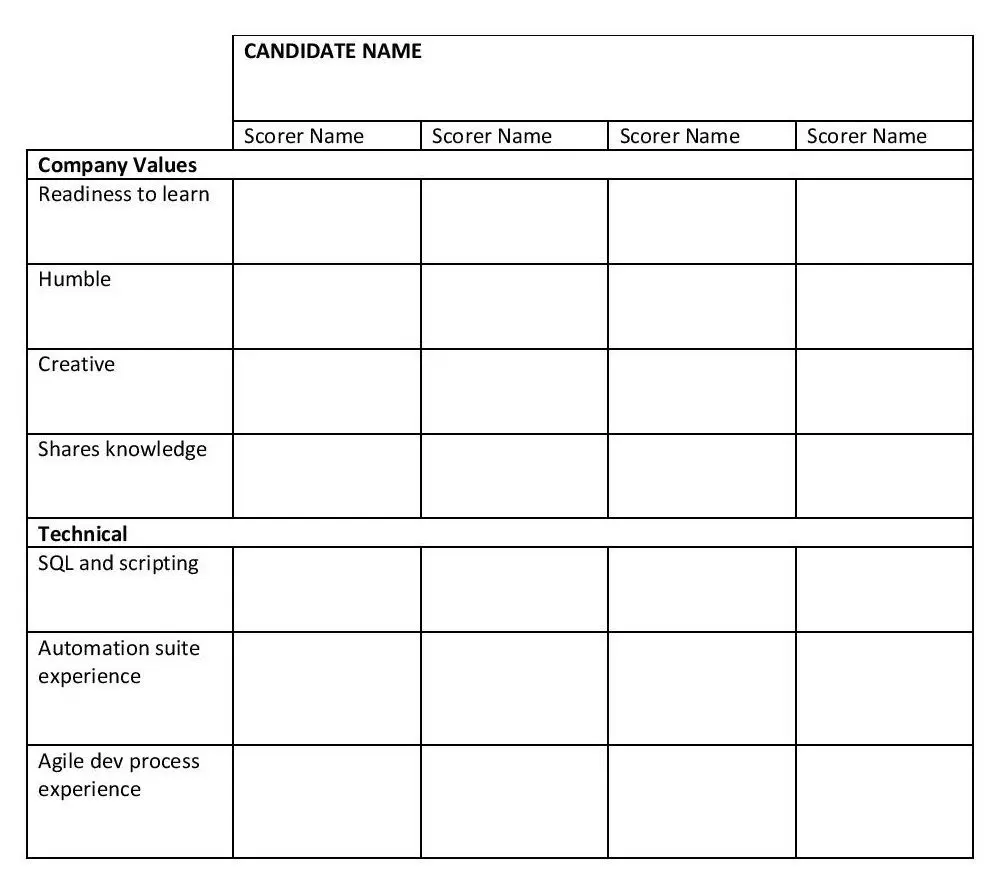How to Recruit Exceptional QA Testers

The testing profession has no set college degree, career path or standard for skillsets, so how do you go about finding exceptional QAs? From innovative concepts like agile hiring and immersive interviewing to classic hiring techniques, I’m pulling back the veil on what it takes to get top testing talent.
But first, what makes a tester exceptional?
At Testlio, we’re not only looking for testing chops but curiosity and passion as well. Curiosity because it leads to creativity and tenacity, thus helping a tester to continuously think outside of the box. And passion because it helps a tester to take ownership for the outcomes of a project and to truly desire to make an impact and add value.
I think a great QA tester understands the user/audience for the application he/she is testing to find the most valuable issues that real users can end up with.
Kristi Kaljurand, Senior QA Team Lead at Testlio

Start by defining your own criteria, both technical and personal dependant on the specific position, be it junior or senior or manual or automated.
Know the nuances of writing job descriptions
To attract the right candidate, you have to include the right information in the job description.
This requires more than listing the details. How do you frame the information? What do you put in and what do you leave out?
As an example, an experienced QA tester will likely be interested in the development processes and organizational structures of the team. For example, a QA Project Manager at Testlio needs experience with and openness to many different testing strategies and methodologies, but at your company there might be a different requirement. Showcasing those methodologies in addition to any technical requirements allows you to find the right fit.
On the other hand, an entry-level tester could be putoff by a long list of technical requirements, since most testers learn on the job.
Reduce turnover by getting to the root cause
Here’s an important question to ask yourself, why are you hiring?
If it’s because of high turnover, it’s important to review all exit interview notes for any common themes. There’s no point in attempting to hire excellent testers if your organization is struggling with a retention issue. Some of these issues will be beyond your control, and some turnover is normal (the current U.S. average is 12.8%).
But if you find testers saying they’re not getting opportunities to learn and grow and feel the need to leave to expand their career, then this is something you can change.
Satisfy curiosity and promote from within
In a recent article given to Entrepreneur magazine, Testlio founder Kristel Kruustük muses:
The irony of spending years in high school and college before getting a job is that what employers want most isn’t any specific (or even highly specialized) body of knowledge; they want employees who can learn on the job.
Kristel Kruustük, Testlio founder.
Before hitting up the outside world, first determine if anyone within your organization is a fit for the job. There may be a tester who is ready to become a test lead or automation engineer. When you continuously bring in new blood for higher skilled positions, you send a clear message that you don’t value the potential of your existing team.
Granted, there are definitely times to bring in fresh eyes and benefit from that initial consultant-like perspective. But you want to be able to get the right people on board and help them grow over time.
Let every interview be slightly different
Immersive interviewing is the process of getting to a know a candidate in the real working environment. After initial phone screenings and/or panel screenings, a candidate might join the team for a couple hours of testing. This ad hoc approach allows you to see their technical skills, how they respond to questions and tasks, and how they mesh with the existing team.
This sort of experience can be hard to quantify, so it’s important to create some form of tracking system, like an immersive interview score sheet, ahead of time. Your team can take notes and/or give a score from 1-10 for each area.

If that approach is not your style, then at least allow for some unstructured Q&A after the pre-defined interview questions. Once you’ve got your main questions answered, allow the conversation to wander a bit and see where the tester leads you. Do they take the lead and ask excellent questions? Do they bring up relevant life experiences?
Recruit like a tester (how can you break them?)
A developer makes and a tester breaks. Now, we don’t really want you to “break” your candidates, but you definitely should ask a couple questions that put them under pressure and allow you to see how they think on the spot.
For example, you can give entry-level testers a simple function (like the ability to login with email and with social media networks) and give them 10 minutes to come up with as many test cases as possible. This exercise will give you the following insights:
- How quickly the person reacts
- How well they trust their intuition and initial instincts
- To what extent they fill the time with repetitive cases versus taking a wider approach
- Whether or not they ask clarifying questions
- How they structure their response (if at all)
While you don’t want the whole interview to be high-stress, you do want a few “on-the-spot” questions that will be revealing of their intellect and intuition.
Discover what the candidate is looking for
Every good hire accelerates your organization; every bad hire is a drag on your organization.
Sean Landis, from the book Agile Hiring
Finding a “good hire” means superseding technical and personality requirements by achieving fit. An often overlooked way to discover if someone is a good fit is to find out what THEY are looking for. What are they invested in and why?
How did they get started in tech, what are their beliefs about QA, and where do they hope to take their career? Instead of impossible-to-answer questions like “where do you see yourself in 5 years?” ask them what they hope to learn and what known areas they intend to improve upon. You can also ask to what extent they get involved with the development process and anything else that will be revealing of fit for your team.
Conventional wisdom says that a good team can absorb a weak member and still perform well but recent research shows that this is not true.
Sean Landis
Above all, make a good impression
When you’re on the hunt for talent (and the economy is doing well) you need to impress your candidates. No need for theatrics, just let them know what makes your company a great place to work.
Skilled, confident QAs know how to sniff out a bad situation—one where the entire team doesn’t take ownership over quality or where growth and creativity go to die.
Work on creating an environment that fosters excellence and figure out how to show it off.
Hiring testers isn’t unlike hiring for other positions, but because there is so much upheaval and change in the industry, you need passionate, forward-thinking QAs on your side.

For access to a community of skilled testers with a full managed testing process, contact us for a demo.
